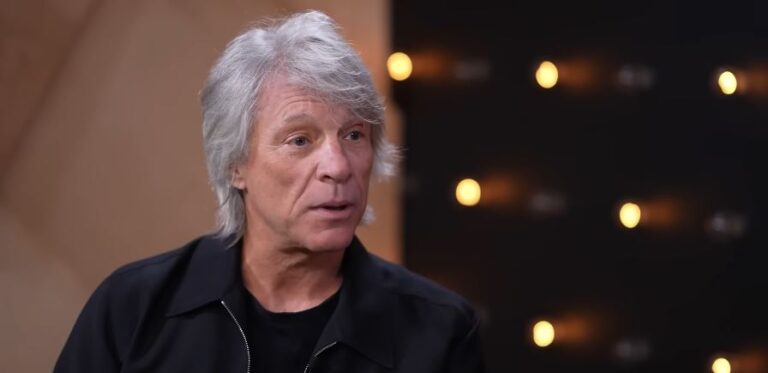Jon Bon Jovi’s financial success isn’t just a short story; it’s a powerful example of longevity, control, and an artist’s refusal to sacrifice their legacy for short-term financial gain. He is still one of the wealthiest people in music, with an estimated net worth of $410 million, despite his conscious efforts to keep his distance from the billion-dollar club. His choice to keep complete ownership of his music library—referring to it as his “baby”—emphasizes a more profound sentiment that is becoming less common among his contemporaries. Jon refuses to back down while others cash out.
The band has regularly made nine-figure sums of money during Bon Jovi’s busiest touring years, and Jon has taken home about $40 million in personal earnings. Those figures are the result of decades of strategic branding, unrelenting touring, and an extremely effective business model—not passive revenue streams. Jon has prioritized depth over speed, much like a skilled craftsman who declines to use prefabricated materials, and the outcome is a portfolio that is incredibly resilient.
| Jon Bon Jovi – Bio, Career & Net Worth Details | |
|---|---|
| Full Name | John Francis Bongiovi Jr. |
| Stage Name | Jon Bon Jovi |
| Date of Birth | March 2, 1962 |
| Age | 63 (as of 2025) |
| Nationality | American |
| Profession | Musician, Actor, Entrepreneur |
| Primary Band | Bon Jovi (Founded 1983) |
| Solo Albums | Blaze of Glory, Destination Anywhere |
| Real Estate Holdings | NYC, Palm Beach, Middletown NJ |
| Estimated Net Worth | $410 Million |
| Philanthropy | JBJ Soul Foundation, Soul Kitchen |
| Official Website | Celebrity Net Worth |
In addition to protecting copyrights, Jon Bon Jovi is upholding generational equity by refusing to sell his catalog. Artists ranging from Springsteen to Justin Bieber have garnered media attention in recent years due to deals exceeding the $200 million mark. Sure, those are wise financial decisions, but they’re also irrevocable. After it is sold, the music is no longer a legacy but a transaction. Jon’s decision is a stark contrast and demonstrates the depth of his long-term thinking.
Bon Jovi’s touring machine is still the gold standard in a live music industry that is still recovering from the pandemic. They made $135 million worldwide in 2019, which shows how relevant they are today. They have outlasted most trends by remaining human, as evidenced by their 14 studio albums, more than 130 million units sold, and a history of hits like “Livin’ on a Prayer” and “Wanted Dead or Alive.” Bon Jovi stays grounded and evolves instead of reinventing himself.
His real estate holdings, which include well-timed acquisitions, astute improvements, and well-timed sales, reflect the sophistication of his music career. His ability to time markets is particularly impressive, as evidenced by the $34 million sale of a SoHo penthouse and the $20 million flip of an oceanfront estate in Florida. He made a $43 million investment in a nearby mansion on the same day that he sold that Palm Beach property, demonstrating a level of financial savvy that many celebrities do not possess.
Beyond his material possessions, his charitable giving shows a stronger dedication to societal advancement. The JBJ Soul Foundation and its subsidiary Soul Kitchen eateries are practical solutions rather than showy gestures. Furloughed workers received free meals from his community kitchens during the 2019 federal government shutdown. These programs are designed to work—quietly and efficiently—not to take pictures.
He is changing the definition of giving back by using his celebrity to further causes. The Soul Kitchen model is especially creative in its structure and dignity, allowing customers to either volunteer or pay for their meal. Reciprocity, not sympathy, is the foundation of this soulful restaurant.
Jon’s range is subtly remarkable, whereas his musical contemporaries frequently find it difficult to genuinely diversify. His popularity has grown as a result of his roles in TV shows like Ally McBeal and movies like U-571. These are supplements, not career changers. He never burns out or overstretches; he moves with purpose.
Another element that is rarely disturbed by scandal or spectacle is Jon’s family life. He has four children, including Jake, who recently wed Stranger Things actress Millie Bobby Brown. He has been married to his high school sweetheart Dorothea since 1989. An intriguing generational crossover is produced by the fusion of Bon Jovi’s classic rock heritage and contemporary Hollywood fame, demonstrating the band’s ongoing cultural relevance.
His grounded demeanor stands in stark contrast to his peers’ high-stakes personas. There is only an artist who knows his lane and navigates it with incredible accuracy; there is no flash or tabloid craze. In a time when virality is rewarded, Bon Jovi’s slow-burn approach is especially welcome.
Jon Bon Jovi has built an emotionally and financially sound empire through constant reinvestment, whether in music, real estate, or social good. He stays very current on stage, in business, and in values, in contrast to many legacy performers who fade into nostalgia circuits.
It’s likely that his charitable work will continue to grow in the upcoming years, perhaps with additional Soul Kitchen locations or stronger collaborations with academic institutions and housing projects. Jon anticipates needs rather than merely following trends. Because of this, his $410 million fortune is not only remarkable but also educational.



